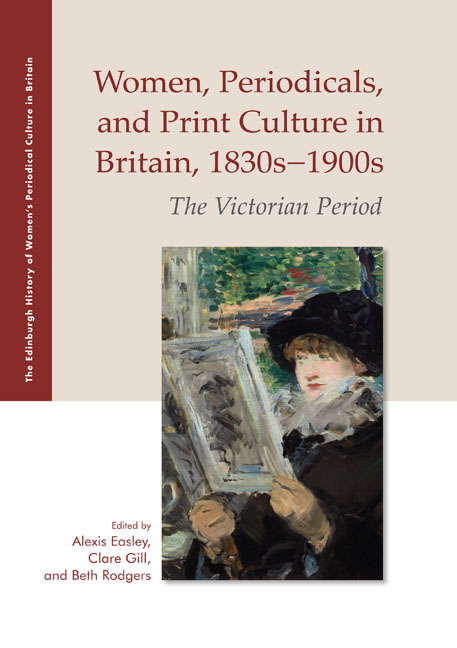Book contents
- Frontmatter
- Contents
- List of Illustrations
- Acknowledgments
- Introduction: Women, Periodicals, and Print Culture in the Victorian Period
- Part I (Re)Imagining Domestic Life
- Part II Constructing Modern Girls and Young Women
- Part III Women and Visual Culture
- Part IV Making Space for Women
- Making Space for Women: Introduction
- 18 Women Journalists and Periodical Spaces
- 19 Making Space for Women's Work in the Leisure Hour: From Variety to ‘Verity’
- 20 Avatars, Pseudonyms, and the Regulation of Affect: Performing and Occluding Gender in the Pall Mall Gazette
- 21 Gender, Anonymity, and Humour in Women's Writing for Punch
- 22 Making Space for Women: The Labour Leader, the Clarion, and the Women's Column
- 23 By the Fireside: Margaret Oliphant's Armchair Commentaries
- Part V Constructing Women Readers and Writers
- Part VI Intervening in Political Debates
- Notes on Contributors
- Index
- Plate section
21 - Gender, Anonymity, and Humour in Women's Writing for Punch
from Part IV - Making Space for Women
Published online by Cambridge University Press: 25 October 2019
- Frontmatter
- Contents
- List of Illustrations
- Acknowledgments
- Introduction: Women, Periodicals, and Print Culture in the Victorian Period
- Part I (Re)Imagining Domestic Life
- Part II Constructing Modern Girls and Young Women
- Part III Women and Visual Culture
- Part IV Making Space for Women
- Making Space for Women: Introduction
- 18 Women Journalists and Periodical Spaces
- 19 Making Space for Women's Work in the Leisure Hour: From Variety to ‘Verity’
- 20 Avatars, Pseudonyms, and the Regulation of Affect: Performing and Occluding Gender in the Pall Mall Gazette
- 21 Gender, Anonymity, and Humour in Women's Writing for Punch
- 22 Making Space for Women: The Labour Leader, the Clarion, and the Women's Column
- 23 By the Fireside: Margaret Oliphant's Armchair Commentaries
- Part V Constructing Women Readers and Writers
- Part VI Intervening in Political Debates
- Notes on Contributors
- Index
- Plate section
Summary
RECENT CRITICISM ON WOMEN'S writing in Victorian periodicals has analysed the ways in which anonymous publication ‘provided women with effective cover for exploring a variety of conventionally “masculine” social issues’ and ‘allowed them to evade essentialized notions of “feminine” voice and identity’ (Easley 2004: 1). A key argument in critics’ explorations of the significance of anonymity is that the assumed masculinity of the anonymous voice gave authority to female writers who wanted to ‘address topics not generally thought of as suitable for a woman's pen’ (Fraser et al. 2003: 11). Although Dallas Liddle has been unable to find evidence of any Victorian commentators putting forward this argument (1997: 34), Marysa Demoor contends that Victorian authors were aware of the advantages of anonymity for women, citing ‘a number of private admonitions by male writers to women writers to hide their gender if they want to be fully and impartially accepted as professional writers by both the reading public and the critics’ (2000: 15). Critical work on the role of anonymity in women's writing for periodicals has generally focused on female writers’ interventions in serious social and political debates, but the theme of anonymity is also relevant to a discussion of women's comic writing in the light of the pervasive idea that women are naturally lacking in a sense of humour.
As Frances Gray observes of the idea that women are deficient in a sense of humour, ‘Men, and indeed some women, have been reiterating this ever since the word “humour” began … to denote a capacity for laughter rather than a bodily fluid’ (1994: 3). Gray includes an example from a 1695 letter by William Congreve, in which he claims that ‘I have never made any Observation of what I apprehend to be true Humour in Women’ (3). As Margaret D. Stetz notes, although this idea is of long standing, it is particularly prevalent in the late nineteenth century, especially in misogynistic attacks on the New Woman, who was depicted as ‘humorless, without wit, unable to address a reader except through harangues or angry sputters’ (2000: 221). The perception of female humourlessness is exemplified by M. H. Spielmann's discussion of female contributors in his 1895 History of ‘Punch’: ‘Women, as a rule, are humourists neither born nor made.
- Type
- Chapter
- Information
- Women, Periodicals and Print Culture in Britain, 1830s–1900sThe Victorian Period, pp. 351 - 364Publisher: Edinburgh University PressPrint publication year: 2019



